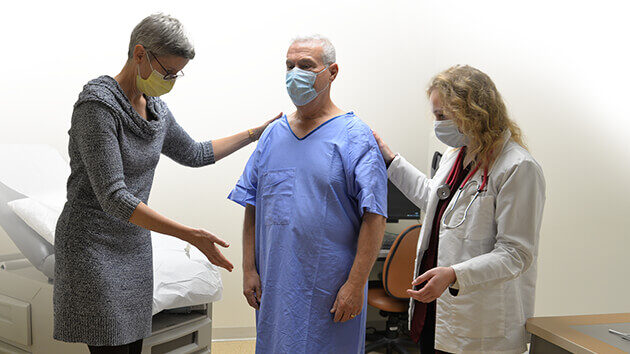Assistant Dean Fosters Open Learning Environment for Med Students

During their four years preparing to become doctors, medical students learn about anatomy, diseases, health inequity and an array of other biomedical topics. In the midst of it, they must also learn to pivot from classroom-based academic studies to clinical situations.
As they face these new challenges, Albany Medical College students now have an additional resource available to them: Assistant Dean of Competency-Based Assessment Rebecca Stetzer, MD.
“My role is to support students, advocate for them and help them to think like doctors,” said Dr. Stetzer, who stepped into the newly created position in May.
Also an advising dean and a geriatric physician at Albany Med’s Internal Medicine Group, Dr. Stetzer works with medical students to advance their clinical reasoning skills – that is, the ability to integrate their medical knowledge with what they learn from the patient’s history and physical exam to deduce an accurate diagnosis.
Tailored to each student’s needs, one-on-one sessions with Dr. Stetzer may involve simulated patient experiences, discussing a case history or working with standardized patients (actors who play the role of patients for student education) in the Patient Safety and Clinical Competency Center (PSCCC). In small group sessions, students practice common areas of challenge and learn from one another.
Dr. Stetzer also helps students to better organize their thoughts – the “think like a doctor” aspect – and effectively communicate them to a patient or another provider. “Being able to reprioritize a list of possible diseases or conditions – known as the differential diagnosis – as new information comes in is critical to clinical reasoning,” she said.
Dr. Stetzer’s teaching philosophy is rooted in fostering an environment that encourages students to share their ideas without fear of being incorrect. Throughout, there are opportunities to discuss the student’s thinking process, reinforce their understanding, or share alternative approaches.
“We don’t want students to memorize answers,” she added. “We want them to understand the process and develop the reasoning skills that will carry them through their careers.”
One student praised the opportunity to work with Dr. Stetzer, noting, “More permission to fail leads to more room to grow.”
Dr. Stetzer, who doesn’t grade or evaluate students, sees her role as an investment on the part of the college to ensure that each student achieves excellence across the board.
“Everyone has weaknesses,” added the student. “Working on them in a safe space with a skilled clinician means your ‘A’ game is that much better, and that you’ll be that much more competitive when it comes time to match with a residency program.”